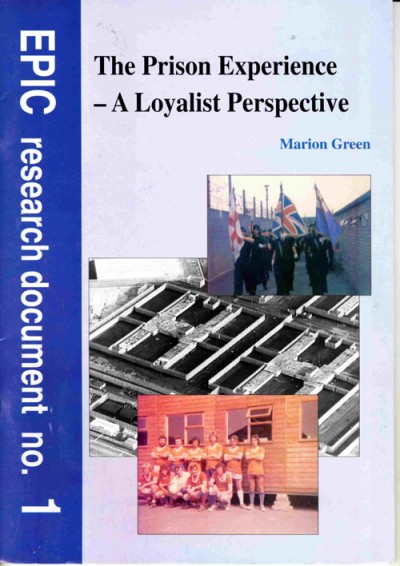The Prison Experience - A Loyalist Perspective

| Date: | 1999 |
|---|---|
| Series: | EPIC Research Document, Number 1 |
| Author: | Marion Green |
| View: | View Document |
| Discuss: | Comments on this document |
| Subjects: |
Please note: The Irish Left Archive is provided as a non-commercial historical resource, open to all, and has reproduced this document as an accessible digital reference. Copyright remains with its original authors. If used on other sites, we would appreciate a link back and reference to The Irish Left Archive, in addition to the original creators. For re-publication, commercial, or other uses, please contact the original owners. If documents provided to The Irish Left Archive have been created for or added to other online archives, please inform us so sources can be credited.
Commentary From The Cedar Lounge Revolution
30th January 2012
“This document [and many thanks to the person who donated it] may seem at first sight an unlikely one to be part of the Left Archive, however it provides both an overview of the general conditions and history of the prison system in Northern Ireland for political prisoners - Loyalist and Republican, and also gives an insight into the relationships between both as well as a developing political consciousness on the part of the former.
Produced in 1998 by the EPIC (Ex-Prisoners’ Interpretative Centre) in Belfast it provides in a series of chapters
The Preface notes that EPIC ‘as a community based self-help organisation welcome [new arena’s for addressing differences and representing communities] and will continue to give our support to these latest developments at the political level, we are also conscious of the impact and legacy of violent conflict at community level’. And…
EPIC has taken responsibility to assist in the reintegration and transformation of ex-prisoners who engaged in the violent conflict. As an integral part of this work EPIC has undertaken intensive research into prison-related issues - whether describing the background to the prison experience itself, or cataloguing the many predicaments, problems and concerns which politically- motivated ex-prisoners encounter upon release.
The Introduction further notes that:
For the past thirty years there have been thousands of Loyalists incarcerated in NI’s prisons and yet very little has been written about the subject. That neglect is all the more noticeable when one considers the number of books and other publications which have appeared dealing with Republican prisoners.
And most importantly given the left orientation of some Loyalist originating political parties:
Just as remarkable has been the crucial impact former prisoners and their associates have made upon the political process - a process once kept remove from working class aspirations and interventions. Within the Loyalist working-class community parties such as the Progressive Unionist Party and the Ulster Democratic Party have done much to help move this entire society away from the politics of intransigence and violence to the politics of accommodation and dialogue, while proving that no surrender of identity or aspiration need be involved in the process.
Inside the document there is a chronological approach, with sections addressing ‘The Early Days: Crumlin Road Jail’ - with interesting anecdotes about how the various paramilitary groupings had to liaise in order to maintain discipline, ‘Internment and Long Kesh’ - and demands for political status where, as is noted, ‘we didn’t get much help from the UUP or the wider unionist population’, ‘Early Prison Protests’, ‘Coping with Life inside’, ‘Fighting Criminalisation’ and so on.
A telling point is made when it is noted that:
Not all the prisoners were interested in politics, some just wanted to get on with their sentences, but a small number of men were interested and they got involved in political debates and discussions, not only with fellow Loyalists but with Official Republicans.
The sense of the prison experience as a crucible for ‘fresh political thinking’, as the document puts it, is strongly reinforced by these observations.”
Comments
No Comments yet.
Add a Comment
Comments can be formatted in Markdown format . Use the toolbar to apply the correct syntax to your comment. The basic formats are:
**Bold text**
Bold text
_Italic text_
Italic text
[A link](http://www.example.com)
A link
You can join this discussion on The Cedar Lounge Revolution
By: Jim Monaghan Mon, 30 Jan 2012 17:07:18
Perhaps it was because of the political difference that the Loyalists did not produce a written political literature. It used to be joked that the Republican did Open University courses and the Loyalists did bodybuilding. Education is a Republican tradition. It is also a very braod education. My mother learned her love of English literature from an ex internee in the 30s. He was ill educated when he was imprisoned and learned from more educated prisoners.
One of the best prison memoirs was something called Seagulls by a cousin of Paddy Devlin. Intereresting because the people depicted were portrayed as real people..
I know it annoys but the Republicans had an ideal.
Reply on the CLR